最新人教版新目标七年级下册英语精学笔记unit5
英语七年级下册人教版uniu5笔记讲解

英语七年级下册人教版uniu5笔记讲解全文共6篇示例,供读者参考篇1Hi friends! Today I'm going to explain the notes for Unit 5 in our English textbook. Get ready because this is going to be a long one!Unit 5 is all about food and healthy eating habits. The first few lessons introduce us to different kinds of food and drinks. We learn words for fruits like apples, bananas and oranges. We also learn words for vegetables like carrots, tomatoes and lettuce. Then we move on to things like milk, juice, water, coffee and tea.One really important lesson is about fast food. We all love McDonald's, KFC and pizza, right? But the book tells us that too much fast food can be unhealthy. Fast food is often high in fat, salt and sugar which can lead to obesity and other health problems if we eat it too frequently. The book recommends limiting fast food to an occasional treat.Instead, we should try to eat more home-cooked meals made with fresh ingredients like lean meats, whole grains, fruits and veggies. These "balanced meals" provide all the nutrientsour bodies need to grow strong and healthy. The textbook has some really yummy looking recipes for balanced meals that even kids can help prepare.Another big part of this unit is about good eating habits and table manners. We learn that it's important to wash our hands before meals, chew with our mouths closed, and avoid talking with food in our mouths. The book also says we shouldn't play with our food or make a mess.My favorite lesson is about special holidays and festivals around the world that involve food traditions. For example, during the American holiday of Thanksgiving, families get together and eat a huge turkey dinner with sides like mashed potatoes, stuffing and cranberry sauce. Yum!In China, the Mid-Autumn Festival is celebrated by eating mooncakes and enjoying the bright full moon with loved ones. And for the Indian festival of Holi, people have fun throwing brightly colored powders made from foods like turmeric, beets and green gram.The readings teach us about the fascinating history behind many of these celebrations too. I think it's so cool to learn about the diverse cultures and customs from around the globe!Towards the end of the unit, the book discusses the importance of physical activity and exercise for staying fit and healthy. It explains that along with a balanced diet, we need at least 60 minutes of exercise every day to keep our hearts strong and prevent obesity.The textbook gives examples of fun activities like playing sports, riding bikes, swimming, dancing and even household chores that can count as exercise. It reminds us that exercising doesn't have to be boring - it can be really enjoyable if we find activities we love!Throughout the unit, we practice useful language for discussing food preferences, ordering at a restaurant, describing how to prepare dishes, and more. There are lots of fun dialogue examples that really bring the lessons to life.The readings also teach us about nutrition facts labels, how to understand ingredients lists, and shopping tips for choosing healthy foods at the grocery store or market. Super practical stuff that I know will come in handy!Honestly, this is one of my favorite units so far because I just love learning about different world cultures and their unique food traditions. The lessons make me want to taste delicacies from every corner of the globe!Plus, developing positive eating habits while I'm still young will help me stay fit as I grow older. I'm going to put what I've learned into practice by trying new fruits and veggies, limiting junk food, and being more active through sports and play. Healthy body, healthy mind!Those are the key points I took away from Unit 5 of our English book. Let me know if any part was still unclear or if you need me to explain further. I'm happy to go into more detail on specific topics that interested you. Study hard and stay healthy, friends!篇2Unit 5 - Our EnvironmentHey guys! In this unit, we're going to learn all about the environment and how we can protect it. It's a super important topic because our planet is our home and we need to take care of it.First up, let's talk about what the environment actually is. The environment is everything around us - the air we breathe, the water we drink, the land we live on, the plants and animals, and even the buildings and roads. It's basically our whole world!Now, why is it so important to protect the environment? Well, for starters, we need a healthy environment to survive. Clean air and water are essential for our health. Plants and animals are also really important because they provide us with food, medicine, and other resources we need.But it's not just about us humans. Plants and animals need a healthy environment to thrive too. When their habitats are destroyed or polluted, they can get sick or even go extinct. And that's really sad because every living thing has an important role to play in the big circle of life.Speaking of pollution, that's one of the biggest threats to our environment. Pollution happens when harmful substances are released into the air, water, or soil. Things like factory smoke, car exhaust, and trash can all cause pollution.Pollution is really bad news for the environment. It can make air and water unsafe, harm plants and animals, and even contribute to climate change. Climate change is the long-term shift in global temperatures and weather patterns, and it's causing all sorts of problems like rising sea levels and more extreme weather events.But don't worry, there are lots of things we can do to help protect the environment! One of the easiest things is to reduce,reuse, and recycle. Reducing means cutting down on the amount of stuff we use and waste we create. Reusing means finding new ways to use things instead of throwing them away. And recycling means turning old materials into new products.We can also save energy by turning off lights and electronics when we're not using them. And walking, biking, or taking public transportation instead of driving can help reduce air pollution from cars.Planting trees and gardens is another great way to help the environment. Trees absorb carbon dioxide (a greenhouse gas that contributes to climate change) and produce oxygen for us to breathe. Plus, gardens provide habitats for bees, birds, and other wildlife.Governments, businesses, and communities are also working hard to protect the environment. They're passing laws to limit pollution, investing in renewable energy sources like solar and wind power, and creating protected areas for plants and animals.But they can't do it alone - we all need to pitch in and do our part. Even small actions like using a reusable water bottle or turning off the tap while brushing our teeth can make a big difference when lots of people do it.So let's all work together to take care of our amazing planet! It's the only one we've got, and we want to make sure it stays healthy and beautiful for generations to come.篇3Title: Explaining Unit 5 of the 7th Grade PEP English TextbookHi kids! In this essay, I'll explain the key points and lessons from Unit 5 of your 7th grade English textbook. Let's get started!Unit 5 is called "An Environmental Aktivist". It's all about someone named Greta Thunberg who tries really hard to protect the environment. She's from Sweden and started protesting about climate change when she was just 15 years old! Pretty cool, right?The unit starts with a reading passage introducing Greta and her story. It says that in 2018, Greta decided to strike from school every Friday. She would sit outside the Swedish parliament holding a sign saying "School Strike for Climate". At first she was alone, but gradually more and more students joined her protest.Greta was trying to get governments and leaders to take stronger action against climate change. She wanted them tolisten to the science and work harder to reduce emissions of greenhouse gases that cause global warming.The passage explains that Greta's solo protest grew into a huge global movement called "Fridays for Future". Millions of students around the world started holding strikes and protests every Friday, inspired by Greta.In 2019, Greta attended the United Nations Climate Action Summit in New York. There she gave a very famous and passionate speech, scolding world leaders for not doing enough about climate change. Her speech got a lot of attention globally.After the reading, there are some exercises to practice your understanding. You have to answer comprehension questions, fill in blanks, put sentences in order, and discuss Greta's reasons for protesting. Pay close attention to the details in the passage!Next up is the language section, focused on modal verbs like "can", "could", "should", "must", etc. The exercises get you using these modals properly to express ability, possibility, obligation and so on. Pretty useful stuff!Then there are some listening exercises where you hear people talk about environmental issues and Greta's activism. Youhave to answer questions and fill in missing details. Good listening practice!The unit also has a long reading about Greta's speech at the UN summit. It's a bit harder than the first passage. The exercises ask you to analyze the speech and Greta's use of rhetorical techniques like rhetorical questions, repetition, and emotive language. This helps build your critical reading skills.In the writing section, you have to write an argumentative essay about climate change, stating your view and providing supporting evidence. You can agree or disagree with Greta's activism, whichever side you choose.For the speaking section, you'll discuss environmental issues in groups and role-play situations related to climate activism. For example, you might role-play a debate between Greta and a world leader about climate policies. Gets you thinking critically and articulating your views!Finally, at the end there are some fun activities like aeco-themed word search and scramble. A nice little break after all the hard work in the unit.That's Unit 5 in a nutshell! By working through it carefully, you'll improve your reading, writing, listening and speaking skillsin English. You'll also learn a lot about the important issue of climate change and Greta Thunberg's impactful activism.Protecting the environment is so crucial for our planet's future. I hope this unit inspires you kids to be more environmentally conscious and to consider taking action, just like Greta did at such a young age. Small steps can lead to big changes when we all work together!Let me know if you have any other questions about Unit 5. Study hard and don't be afraid to raise your voice for causes you believe in!篇4Unit 5: My Favorite ThingsHey there, friends! It's me again, ready to share my thoughts on Unit 5 from our English textbook. This time, we're diving into the world of our favorite things – the stuff that makes us happy and puts a smile on our faces. Get ready for some fun stories and interesting vocabulary!The unit kicks off with a dialogue between Sam and Lucy. They're chatting about their favorite things, and it's pretty relatable stuff. Sam loves playing basketball, while Lucy is moreinto reading novels. It's cool to see how different people can have such diverse interests, right?One of the first new words we learn is "collection." A collection is a group of things that someone likes to gather and keep, like stamps, coins, or rocks. Personally, I've got a pretty sweet collection of Pokémon cards going on. Gotta catch 'em all!Next up, we read a story about a girl named Li Ming and her grandpa. It's called "My Grandpa's Treasures." Li Ming thinks her grandpa's old things are just junk, but he explains that they're actually treasures with special memories attached. By the end, Li Ming realizes how important it is to appreciate the things that matter to our loved ones, even if they seem ordinary to us.There are some great vocabulary words in this story, like "treasure" (something precious), "valuable" (worth a lot), and "memorabilia" (objects that bring back memories). I really liked learning about how different cultures value different things. For example, in China, certain stamps or ancient coins could be seen as priceless treasures!The next reading is a short article called "What's Your Favorite Sport?" It talks about different popular sports around the world, like soccer, basketball, and gymnastics. I was surprised to learn that table tennis is really big in China – who knew? Thearticle had some handy words about sports, like "teammate," "opponent," and "champion."Then we get to one of my favorite parts of the unit: a poem called "My Teddy Bear." It's a cute, rhyming poem about a kid's love for their special stuffed animal. Even though we're getting older, I think lots of us still have that one toy or blanket thatwe've had forever and can't let go of. The poem uses great descriptive words like "cuddly," "furry," and "cherished."We also practiced using possessive pronouns, like "my," "your," "his," and "her." These help us show ownership and talk about the things that belong to us or others. For instance, I might say, "That's my comic book collection over there."One of the highlights for me was the project we did at the end of the unit. We had to create a little museum exhibit showcasing our favorite things and explaining why they're so special to us. I made a display about my beloved superhero action figures. Others showed off things like seashell collections, family heirlooms, or trophies from their favorite sports. It was so cool to see the range of interests and learn about the stories behind everyone's treasures.Overall, Unit 5 was a fun one! It reminded me to appreciate the simple things that bring me joy, whether it's a beloved toy, afun hobby, or just quality time with family and friends. Plus, I got to expand my English vocabulary with words all about describing the things we love most.I'm already looking forward to the next unit. Who knows what exciting adventures await? But for now, I'll just kick back, relax, and enjoy some of my favorite things. Maybe I'll even bust out that old teddy bear for a cuddle. No judgments, okay?篇5Here are notes explaining Unit 5 from the English textbook for 7th grade, second semester (PEP edition) in about 2000 words, written in an elementary student's tone:Unit 5 - Sharing FeelingsHey friends! This unit is all about feelings and how we express them. It's really important to understand our emotions and be able to talk about them in a healthy way. Let's dive in!Part A: At the PlaygroundThe first part introduces us to two friends, Mona and Jean. They're hanging out at the playground and chatting. Mona seems really excited about something, while Jean looks a bit worried or sad.The conversations have some useful expressions for showing different feelings:"How exciting!" shows you're feeling thrilled or enthusiastic about something."That's too bad" is a way to sympathize when someone tells you bad news."Cheer up" is what you say to encourage a sad friend to feel happier.We also learn about using "so" to give a reason for a feeling. Like "I'm so excited because..." or "I'm so sad that..." Being able to explain our feelings helps others understand us better.Part B: Expressing FeelingsThis section teaches us more ways to talk about emotions in English. There are words for basic feelings like:Happy, glad, delighted (positive feelings)Sad, unhappy, upset (negative feelings)Afraid, scared, frightened (feelings of fear)But there are also more specific emotion words like:Proud, embarrassed, disappointed, relieved, etc.The examples show how to use these feeling words in sentences like "I feel proud that I did well on the test." Pay attention to the patterns!Part C: An EmailNow we get to read an email that Danny wrote to his friend Alex. In it, Danny talks about his cousin Mark coming to visit. He expresses different emotions about the situation:He's excited because they'll get to do fun activities together.But he's also a bit nervous because Mark is quite a few years older.And he feels worried that Mark might think he's just a little kid.Danny uses great expressions like "I can't wait to..." to show his enthusiasm. And he asks Alex for advice on how to get along better with his older cousin.Part D: A StoryFinally, there's a short story called "The Package." It's about a boy named Tim who orders a pet lizard online as a surprise for his sister. But there's some miscommunication and confusion with the delivery!As you read, notice how the characters' feelings change throughout based on the events:Tim is eager and impatient at first, waiting for the package.Then he's shocked and disappointed when there's no lizard inside!His sister is first puzzled, then amused when she realizes what happened.The story uses great descriptive language to convey the emotions the characters are experiencing. Pay close attention to those details!Well, that's the overview of Unit 5! Remember, understanding and expressing feelings is an important life skill. The more you practice, the better you'll get at it. Let me know if you have any other questions!篇6Hi there, fellow students! Today, we're going to dive into Unit 5 of our English textbook, and I'll be your guide through this exciting journey. Get ready to explore new topics, sharpen your language skills, and maybe even have a bit of fun along the way!The unit kicks off with a delightful conversation between two friends, Amy and Tom. They're chatting about their plans for the upcoming summer vacation. Amy mentions that she's going to visit her grandparents in the countryside, while Tom excitedly shares that he'll be attending a summer camp. Can you relate to the excitement of making plans for the holidays? I know I can!As we move further into the unit, we'll learn all about different kinds of vacations and the activities people enjoy during their time off. From camping and hiking to visiting museums and historical sites, there's something for everyone. Who knows, maybe you'll get some inspiration for your next family trip!One of the highlights of this unit is learning how to talk about future plans and intentions. We'll explore various ways to express what we're going to do, what we want to do, and what we're planning to do. Trust me; these language skills will come in handy when you're making plans with your friends or family.Speaking of plans, have you ever thought about what you'd like to do when you grow up? Well, this unit also covers different professions and the qualities required for certain jobs. You might discover your dream career or at least get a better understanding of the vast array of possibilities out there.But that's not all! We'll also delve into the world of science and technology, exploring fascinating topics like robots, artificial intelligence, and space exploration. Who knows, maybe one of you will become a future scientist or engineer and make groundbreaking discoveries!Throughout the unit, we'll encounter a variety of engaging texts, including conversations, stories, and informative passages. These will not only help us improve our reading comprehension skills but also provide valuable insights into different cultures and perspectives.And let's not forget about the fun activities and exercises! From role-playing scenarios to puzzles and games, there's no shortage of interactive learning opportunities. These will help reinforce the concepts we've learned and make the learning process more enjoyable.Now, I know what you might be thinking: "That's a lot of stuff to cover!" And you're absolutely right. But don't worry; we'll take it one step at a time, and I'll be here to guide you every step of the way. Remember, learning a language is a journey, and the more we practice and explore, the better we'll become.So, are you ready to embark on this exciting adventure with me? Let's dive into Unit 5 and discover all the amazing things it has in store for us!。
七年级下册英语人教版unit5知识点
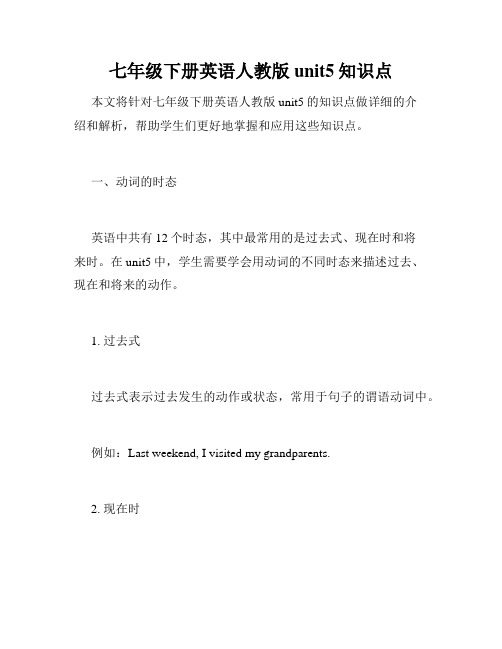
七年级下册英语人教版unit5知识点本文将针对七年级下册英语人教版unit5的知识点做详细的介绍和解析,帮助学生们更好地掌握和应用这些知识点。
一、动词的时态英语中共有12个时态,其中最常用的是过去式、现在时和将来时。
在unit5中,学生需要学会用动词的不同时态来描述过去、现在和将来的动作。
1. 过去式过去式表示过去发生的动作或状态,常用于句子的谓语动词中。
例如:Last weekend, I visited my grandparents.2. 现在时现在时表示现在正在进行或习惯性的动作,常用于句子的谓语动词中。
例如:I usually have breakfast at 7 o'clock in the morning.3. 将来时将来时表示将来要发生的动作或状态,常用于句子的谓语动词中。
例如:I will go to the cinema with my friends tomorrow evening.二、形容词和副词的用法形容词和副词在语言中非常常用,它们用于修饰名词或动词,可以使语言更加生动、形象,并且更好地传达作者的意图。
1. 形容词形容词用于修饰名词,表示该名词的某种特征或属性。
例如:I love this beautiful flower.2. 副词副词用于修饰动词、形容词或其他副词,表示某个动作或状态的程度、方式或时间等。
例如:The girl sings beautifully.三、疑问词的用法疑问词用于构成疑问句,在英语中有很多不同的疑问词,比如who、what、when、where、why等。
学生需要学会这些疑问词的用法和搭配。
例如:What is your favorite color?四、短语动词的用法短语动词是由一个动词和一个或多个介词、副词组合而成的,具有固定的词组搭配,是英语中非常常用的一种语言形式。
例如:The teacher asked the students to turn off their phones.五、时态和语态的转换学生需要学会将动词的时态和语态进行转换,以便更好地表达自己的意思。
人教版七年级英语下册Unit5知识点归纳

Unit5 Why do you like pandas?知识点归纳一、重点短语1. importance in Thailand 在泰国的重要性2. Let’s see…. first. 让我们先看...3. favorite animals 最喜欢的动物4. kind of interesting 有点有趣5. South Africa 南非6. be from =come from 来自7. be smart 聪明的8. walk on two legs 用两条腿走9. all day/all night 整天/整夜10. a good name for her 对于她是个好名字11. like …a lot 非常喜欢......12. black and white 黑白相间13. You’re right. 你是正确的。
14. one of +名词复数(......其中之一)15. our first flag 我们的第一面旗16. a symbol of good luck 好运的象征17. draw well 画得好18. forget to do 忘记做某事19. get/be lost 迷路20. places with food and water有食物和水的地方21. be in great danger 处于危险22. cut down 砍倒23. over = more than 超过/多于24 be made of... 由…制成25.Thai Elephant Day 大象二、用法归纳1. —Why…? 为什么……?—Because… 因为……2. let sb. do sth. 让某人做某事3. want to do sth. 想要做某事4. one of+名词复数……之一5. forget to do sth. 忘记要做某事6. forget doing sth. 忘记做过某事7. help sb. (to) do sth. 帮助某人做某事8. be friendly to sb. 对某人友好三、重点句子1. —Why do you like pandas? 你为什么喜欢熊猫?—Because they’re kind of interesting. 因为它们有点儿有趣。
人教版新目标英语七年级下册Unit5知识点总结
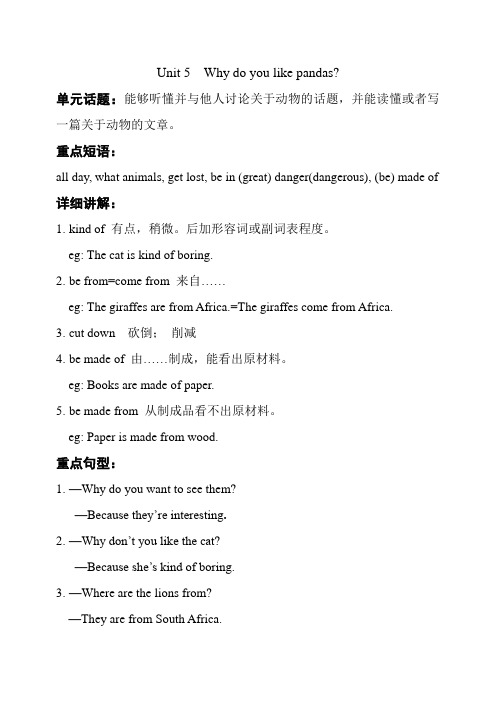
Unit 5 Why do you like pandas?单元话题:能够听懂并与他人讨论关于动物的话题,并能读懂或者写一篇关于动物的文章。
重点短语:all day, what animals, get lost, be in (great) danger(dangerous), (be) made of 详细讲解:1.kind of 有点,稍微。
后加形容词或副词表程度。
eg: The cat is kind of boring.2.be from=come from 来自……eg: The giraffes are from Africa.=The giraffes come from Africa.3.cut down 砍倒;削减4.be made of 由……制成,能看出原材料。
eg: Books are made of paper.5.be made from 从制成品看不出原材料。
eg: Paper is made from wood.重点句型:1.—Why do you want to see them?—Because they’re interesting.2.—Why don’t you like the cat?—Because she’s kind of boring.3.—Where are the lions from?—They are from South Africa.4. We must save the trees and not buy things made of ivory.知识点讲解:1.let’s+动词原形十其他(名词) let’s是let us的缩略形式,意思是“让我们”。
是提出建议的一种句型。
如Let’s go shopping!我们去购物吧!2.Why do you want to see the lions? 你们为什么想看狮子? Because they’re cute.因为它们可爱。
新人教七年级下Unit 5 课堂笔记
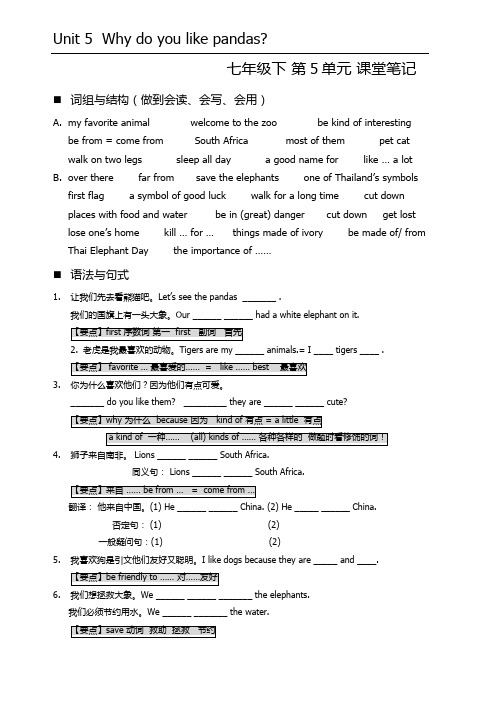
Unit 5 Why do you like pandas?七年级下第5单元课堂笔记⏹词组与结构(做到会读、会写、会用)A.my favorite animal welcome to the zoo be kind of interestingbe from = come from South Africa most of them pet cat walk on two legs sleep all day a good name for like … a lot B.over there far from save the elephants one of Thailand’s symbolsfirst flag a symbol of good luck walk for a long time cut down places with food and water be in (great) danger cut down get lost lose one’s home kill … for … things made of ivory be made of/ from Thai Elephant Day the importance of ……⏹语法与句式1.让我们先去看熊猫吧。
Let’s see the pandas _______ .我们的国旗上有一头大象。
Our ______ ______ had a white elephant on it.2.老虎是我最喜欢的动物。
Tigers are my ______ animals.= I ____ tigers ____ .3.你为什么喜欢他们?因为他们有点可爱。
_______ do you like them? _________ they are ______ ______ cute?4.狮子来自南非。
Lions ______ ______ South Africa.同义句: Lions ______ ______ South Africa.翻译:他来自中国。
人教版本初中七年级的英语下册的Unit5学习知识点讲解
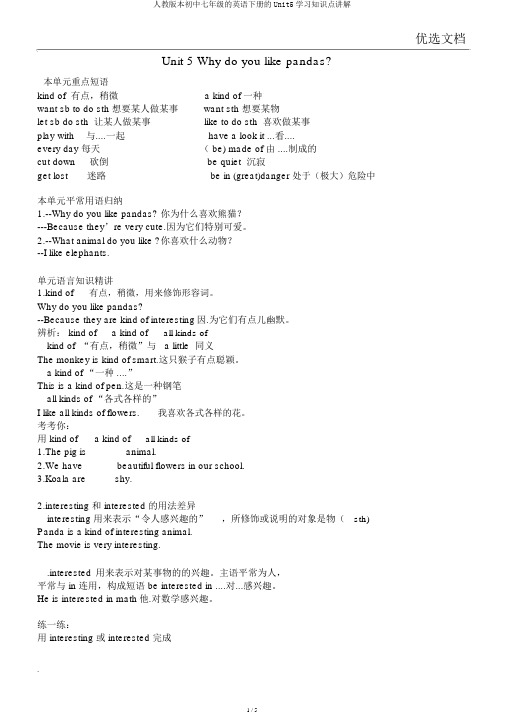
优选文档Unit 5 Why do you like pandas?本单元重点短语kind of 有点,稍微 a kind of 一种want sb to do sth 想要某人做某事want sth 想要某物let sb do sth 让某人做某事like to do sth 喜欢做某事play with与....一起have a look it ...看....every day 每天( be) made of 由 ....制成的cut down砍倒be quiet 沉寂get lost迷路be in (great)danger 处于(极大)危险中本单元平常用语归纳1.--Why do you like pandas? 你为什么喜欢熊猫?---Because they’re very cute.因为它们特别可爱。
2.--What animal do you like ?你喜欢什么动物?--I like elephants.单元语言知识精讲1.kind of有点,稍微,用来修饰形容词。
Why do you like pandas?--Because they are kind of interesting因.为它们有点儿幽默。
辨析: kind of a kind of all kinds ofkind of “有点,稍微”与 a little 同义The monkey is kind of smart.这只猴子有点聪颖。
a kind of “一种 ....”This is a kind of pen.这是一种钢笔all kinds of “各式各样的”I like all kinds of flowers.我喜欢各式各样的花。
考考你:用 kind of a kind of all kinds of1.The pig is _______animal.2.We have ______beautiful flowers in our school.3.Koala are _____shy.2.interesting 和 interested 的用法差异interesting 用来表示“令人感兴趣的”,所修饰或说明的对象是物(sth)Panda is a kind of interesting animal.The movie is very interesting..interested 用来表示对某事物的的兴趣。
最新人教版新目标七年级下册英语精学笔记unit5
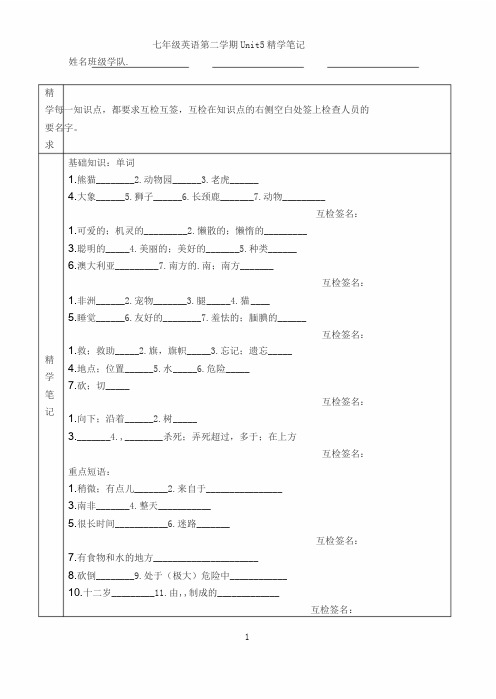
七年级英语第二学期Unit5精学笔记姓名班级学队.精学每一知识点,都要求互检互签,互检在知识点的右侧空白处签上检查人员的要名字。
求基础知识:单词1.熊猫________2.动物园______3.老虎______4.大象______5.狮子______6.长颈鹿_______7.动物_________互检签名:1.可爱的;机灵的_________2.懒散的;懒惰的_________3.聪明的_____4.美丽的;美好的_______5.种类______6.澳大利亚_________7.南方的.南;南方_______互检签名:1.非洲______2.宠物_______3.腿_____4.猫____5.睡觉______6.友好的________7.羞怯的;腼腆的______互检签名:精学笔记1.救;救助_____2.旗,旗帜_____3.忘记;遗忘_____4.地点;位置______5.水_____6.危险_____7.砍;切_____互检签名:1.向下;沿着______2.树_____3._______4.,________杀死;弄死超过,多于;在上方互检签名:重点短语:1.稍微;有点儿_______2.来自于________________3.南非_______4.整天___________5.很长时间___________6.迷路_______互检签名:7.有食物和水的地方______________________8.砍倒________9.处于(极大)危险中____________10.十二岁_________11.由,,制成的_____________互检签名:2.--为什么?__________--因为,,_________3.让某人做某事____________.14想要做某事__________5.,,之一_____________16.忘记要做某事____________2.忘记做过某事______________18.对某人友好______________互检签名:重点句子:4.你为什么喜欢熊猫?-______doyoulikepandas?5.因为他们有点儿有趣_________they’re________interesting.6.约翰为什么喜欢树袋熊?-Why______John______koalas?7.因为它们非常可爱。
人教新目标七年级英语下册Unit5重难点知识归纳总结
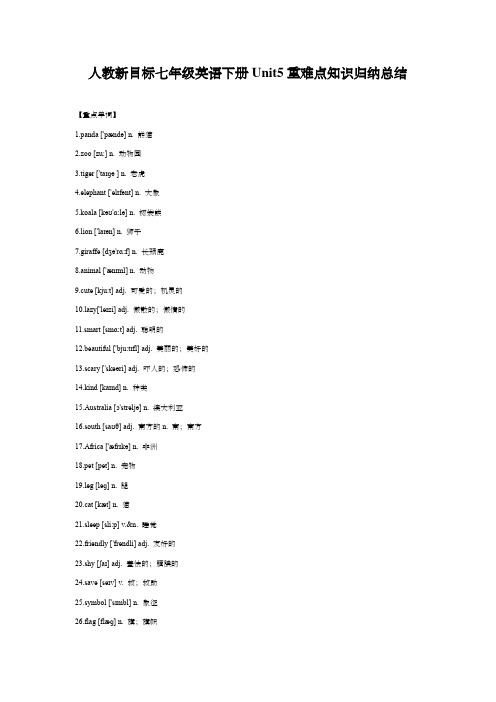
人教新目标七年级英语下册Unit5重难点知识归纳总结【重点单词】1.panda ['pændə] n. 熊猫2.zoo [zu:] n. 动物园3.tiger ['taɪɡə ] n. 老虎4.elephant ['elɪfənt] n. 大象5.koala [kəʊ'ɑ:lə] n. 树袋熊6.lion ['laɪən] n. 狮子7.giraffe [dʒə'rɑ:f] n. 长颈鹿8.animal ['ænɪml] n. 动物9.cute [kju:t] adj. 可爱的;机灵的zy['leɪzi] adj. 懒散的;懒惰的11.smart [smɑ:t] adj. 聪明的12.beautiful ['bju:tɪfl] adj. 美丽的;美好的13.scary ['skeəri] adj. 吓人的;恐怖的14.kind [kaɪnd] n. 种类15.Australia [ɔ'streljə] n. 澳大利亚16.south [saʊθ] adj. 南方的n. 南;南方17.Africa ['æfrɪkə] n. 非洲18.pet [pet] n. 宠物19.leg [leɡ] n. 腿20.cat [kæt] n. 猫21.sleep [sli:p] v.&n. 睡觉22.friendly ['frendli] adj. 友好的23.shy [ʃaɪ] adj. 羞怯的;腼腆的24.save [seɪv] v. 救;救助25.symbol ['sɪmbl] n. 象征26.flag [flæɡ] n. 旗;旗帜27.forget [fə'ɡet] v. 忘记;遗忘28.place [pleɪs] n. 地点;位置29.water ['wɔ:tə ] n. 水30.danger ['deɪndʒə] n. 危险31.cut [kʌt] v. 砍;切32.down [daʊn] adv.(坐、躺、倒)下prep.向下;沿着33.tree [tri:] n. 树34.kill [kɪl] v. 杀死;弄死35.ivory ['aɪvəri] n. 象牙36.over ['əʊvə ] prep. 超过;多于;在……上方【重点短语】1. favorite animals 最喜欢的动物2. kind of interesting 有点儿有趣3. be from 来自4. be smart 聪明的5. walk on two legs 用两条腿走6. all day/all night 整天/整夜7. a good name for her 对于她是个好名字8. black and white 黑白相间9. our first flag 我们的第一面旗10. a symbol of good luck 好运的象征11. draw well 画得好12. forget to do sth. 忘记做某事13. get/be lost 迷路14. places with food and water有食物和水的地方15. be in great danger 处于极大危险中16. cut down 砍倒17. be made of... 由……制成【重点句型】1. —Let’s see the pandas first. They’re my favorite animals.咱们先看熊猫吧,我最喜欢熊猫了。
七年级下人教版英语u5知识点
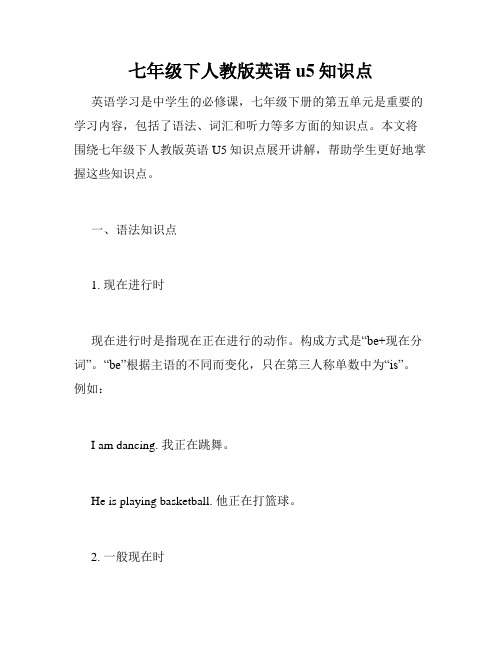
七年级下人教版英语u5知识点英语学习是中学生的必修课,七年级下册的第五单元是重要的学习内容,包括了语法、词汇和听力等多方面的知识点。
本文将围绕七年级下人教版英语U5知识点展开讲解,帮助学生更好地掌握这些知识点。
一、语法知识点1. 现在进行时现在进行时是指现在正在进行的动作。
构成方式是“be+现在分词”。
“be”根据主语的不同而变化,只在第三人称单数中为“is”。
例如:I am dancing. 我正在跳舞。
He is playing basketball. 他正在打篮球。
2. 一般现在时一般现在时是指现在经常性或普遍性的动作或状态。
构成方式是动词原形或第三人称单数形式。
例如:I like ice cream. 我喜欢冰淇淋。
My mother washes vegetables every day. 我妈妈每天洗蔬菜。
3. 过去式过去式是指已经发生了的动作或状态。
大多数动词的过去式是在词尾加-ed。
如果动词是以e结尾,只加d。
如果动词是以辅音字母+y结尾,变y为i再加ed。
例如:I played basketball yesterday. 我昨天打了篮球。
He watched TV last night. 他昨晚看了电视。
二、词汇知识点1. 衣服类词汇shirt n.衬衫pants n.裤子shorts n.短裤socks n.袜子shoes n.鞋子2. 家庭成员类词汇father n.父亲mother n.母亲grandfather n.祖父grandmother n.祖母sister n.姐妹brother n.兄弟三、听力知识点1. 语音语调英语的语音和语调是学习者需要注意的重点,正确掌握这些内容有助于提高听力和口语表达能力。
2. 听取细节信息在听力练习中,学生需要注意听取细节信息,例如具体时间、地点、人物等,以便更好地理解所听内容。
3. 相关词汇积累在听力过程中,如果遇到不认识的词汇,学生应该牢记下来并尝试查阅相关字典或资料,以便在以后的学习中逐渐积累。
七年级英语下册 语法重点复习整理unit 5 人教新目标版
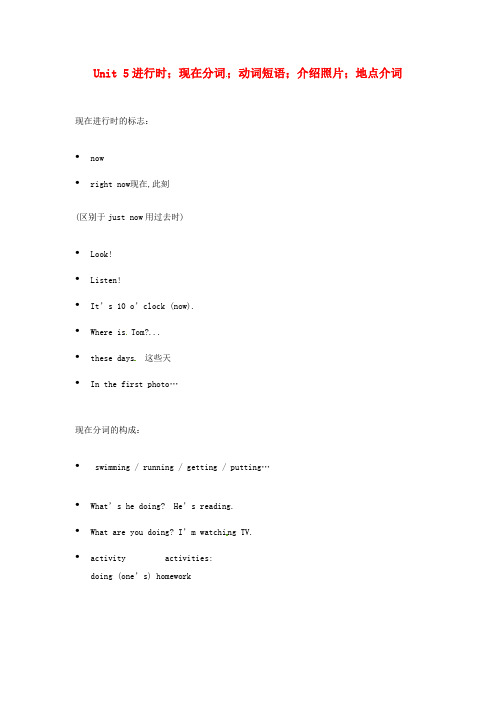
Unit 5进行时;现在分词;动词短语;介绍照片;地点介词现在进行时的标志:• now• right now现在,此刻(区别于just now用过去时)• Look!• Listen!•It’s 10 o’clock (now).• Where is Tom?...• these days这些天•In the first photo…现在分词的构成:•swimming / running / getting / putting…•What’s he doing? He’s r eading.•What are you doing? I’m watchi ng TV.• activity activities:doing (one’s) homeworkwatching TVcleaning the roomeating dinnerreadingwriting a lettertalking on the phone (take / talk)activities:writing a letter购物shop --- shopping去购物go shoppingswimming at the pooleating (错误eatting)places:on the playgroundat the swimming poolat the mallin the libraryat schoolat home• That sounds good.• This TV show is boring.• This video is boring.• Do you want to go to the movies? • When do you want to go? •Let’s go at 6 o’clock.• Sure.• What is happening?发生• wait for sb. / sth.等待• What are the y talking about?谈论• Who are they talking to?与…聊天•what’s = what is•he’s = he is•she’s = she isThanks for sth. / doing sth.Thank you for sth. / doing sth.Thanks for your letter an d the photos. Thank you for helping me.Thanks for your help.a letter from Lucy to Tom• Here is / are…Here are some of my photos.Here is the money.I’m w i th my sister.be with sb. 与某人在一起in the first / second / next / last photo a photo of my familyThis is … and that is …由近及远• take photos with a camera• let sb. do sth. (Let me help you.)• put on 穿上(动作)(Put on your coat. It’s cold outside.)• wear 穿着(状态)(She is wearing a dress today.)• in 修饰在名词后面(the girl in red / the boy in a hat / the woman in a yellow dress) She is in a red skirt.= She is wearing a red skirt.• surf --- surfing冲浪• familyMy family has a shower.家庭My family are all at home today.家人以下这些词做主语,谓语动词用单数:someone 某人;有人somebodyno one 没有人nobodyanyone 任何人everyone 每个人• come / go / leave / arrive可现在进行时表将来。
最新人教版新目标七年级下册英语精学笔记unit5教学内容
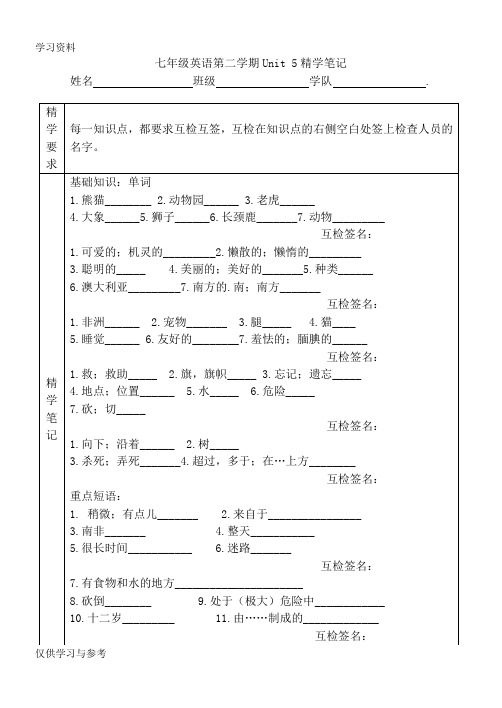
互检签名:
5.-_________ you like tigers?你为什么不喜欢老虎?
-Because they’re _________. 因为它们真的吓人
6.-Where ____lions ______?狮子来自哪里?
5.睡觉______ 6.友好的________7.羞怯的;腼腆的______
互检签名:
1.救;救助_____ 2.旗,旗帜_____ 3.忘记;遗忘_____
4.地点;位置______ 5.水_____ 6.危险_____
7.砍;切_____
互检签名:
1.向下;沿着______ 2.树_____
3.杀死;弄死_______4.超过,多于;在…上方________
11 .现在仅有大约3000头大象(之前有超过10万头大象)。
Today , there are only about 3,000 elephants (_______100,000 before).
互检互签:
知识点一:Because she’s kind of boring . 因为她有点无聊.
用法:kind of 意为’______、稍微“,后接__________。 kind of=_________=a bit=a little bit
17.忘记做过某事______________18.对某人友好______________
互检签名:
重点句子:
1.你为什么喜欢熊猫?-______ do you like pandas?
2. 因为他们有点儿有趣_________they’re________interesting.
新目标七年级英语下unit5知识点总结和练习
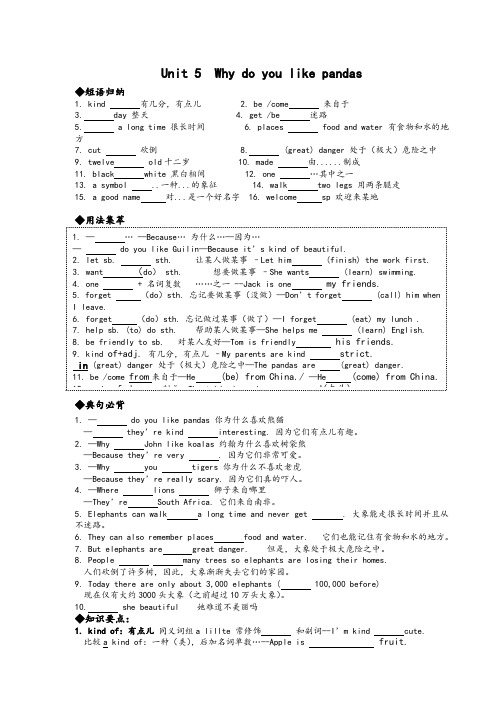
Unit 5 Why do you like pandas◆短语归纳1. kind 有几分,有点儿2. be /come来自于3.day 整天4. get /be迷路5. a long time 很长时间6. places food and water 有食物和水的地方7. cut 砍倒 8. (great) danger 处于(极大)危险之中9. twelve old十二岁 10. made 由......制成11. black white 黑白相间 12. one …其中之一13. a symbol ..一种...的象征 14. walk two legs 用两条腿走15. a good name对...是一个好名字 16. welcome sp 欢迎来某地◆用法集萃◆典句必背1. — do you like pandas 你为什么喜欢熊猫—they’re kind interesting. 因为它们有点儿有趣。
2. —Why John like koalas 约翰为什么喜欢树袋熊—Because they’re very . 因为它们非常可爱。
3. —Why you tigers 你为什么不喜欢老虎—Because they’re really scary. 因为它们真的吓人。
4. —Where lions 狮子来自哪里—They’re South Africa. 它们来自南非。
5. Elephants can walk a long time and never get . 大象能走很长时间并且从不迷路。
6. They can also remember places food and water. 它们也能记住有食物和水的地方。
7. But elephants are great danger. 但是,大象处于极大危险之中。
8. People many trees so elephants are losing their homes.人们砍倒了许多树,因此,大象渐渐失去它们的家园。
人教版七年级下册笔记 —— Unit 5
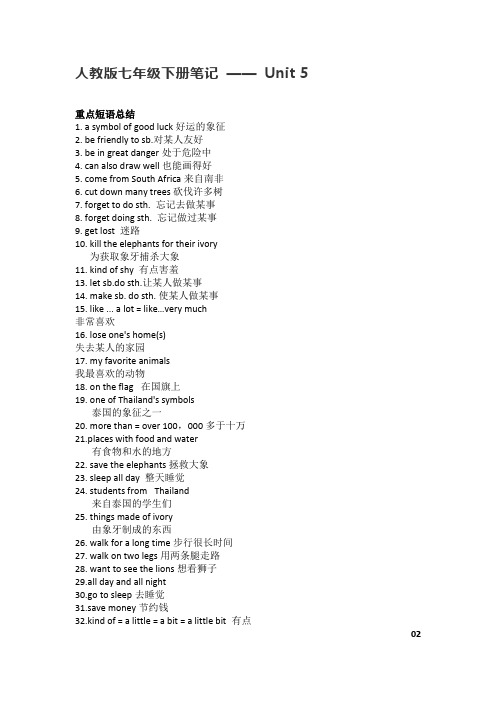
人教版七年级下册笔记——Unit 5重点短语总结1. a symbol of good luck好运的象征2. be friendly to sb.对某人友好3. be in great danger处于危险中4. can also draw well也能画得好5. come from South Africa来自南非6. cut down many trees砍伐许多树7. forget to do sth. 忘记去做某事8. forget doing sth. 忘记做过某事9. get lost 迷路10. kill the elephants for their ivory为获取象牙捕杀大象11. kind of shy 有点害羞13. let sb.do sth.让某人做某事14. make sb. do sth. 使某人做某事15. like ... a lot = like…very much非常喜欢16. lose one's home(s)失去某人的家园17. my favorite animals我最喜欢的动物18. on the flag 在国旗上19. one of Thailand's symbols泰国的象征之一20. more than = over 100,000多于十万21.places with food and water有食物和水的地方22. save the elephants拯救大象23. sleep all day 整天睡觉24. students from Thailand来自泰国的学生们25. things made of ivory由象牙制成的东西26. walk for a long time步行很长时间27. walk on two legs用两条腿走路28. want to see the lions想看狮子29.all day and all night30.go to sleep去睡觉31.save money节约钱32.kind of = a little = a bit = a little bit 有点02重点词的用法总结1.kind1) n. 种类。
七下英语第五单元笔记

七下英语第五单元笔记
以下是七下英语第五单元的笔记,供您参考:
1. 重点单词:
weekend(n.)周末
usually(ad.)通常
sometimes(ad.)有时
seldom(ad.)很少
never(ad.)从不
on weekends(介词短语)在周末
go to the movies(短语)去看电影
stay at home(短语)呆在家里
2. 重点短语:
do homework(短语)做作业
watch TV(短语)看电视
go to the park(短语)去公园
visit grandparents(短语)拜访祖父母
3. 重点句型:
What do you usually do on weekends?(疑问句)你通常在周末做什么?
I usually do my homework.(陈述句)我通常做作业。
How often do you go to the movies?(疑问句)你多久去看一次电影?
I go to the movies twice a month.(陈述句)我每个月看两次电影。
4. 重点语法:
频率副词的使用,如always、usually、sometimes、seldom、never等。
疑问句和陈述句的转换,如将疑问句转换为陈述句或将陈述句转换为疑问句。
5. 重点发音:
/æ/音标的发音,如单词“cat”、“bag”、“man”等。
2017年春季最新人教版新目标七年级英语下册unit5精学笔记
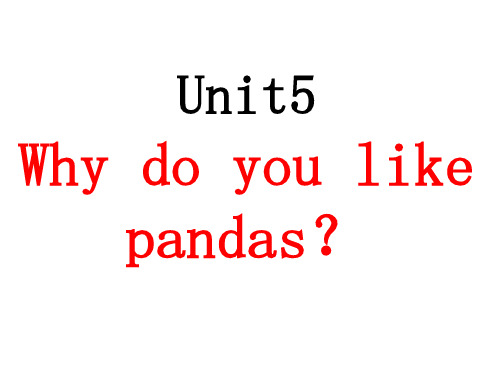
用OK,/All right,/Good idea.
知识点二拓展
提出建议的常用句型: 1.Shall we +动原?我们做…好吗? 2.Why don’t you +动原?
=Why not+动原?为什么不做某事? 3.What /How about +动词-ing …?
-Why d__o_e__s_John l_i_k_e___koalas? 4.因为它们非常可爱。-Because
they’re very _c_u_t_e__.
重点句型: 5.-_W__h__y__d_o_ny’out like tigers?
你为什么不喜欢老虎? -Because they’re __r_e_a__ll_y__s.cary
做某事怎么样?
知识点二精练
1.Let’s __h_e__lp_ (help) mother do the housework.
2.Let’s __e_a_t___ (eat) some apples.
3.-Let’s play computer games. - __C____,I have too much
18.对某人友好_b__e__fr_i_e_n__d_l_y__t_o
重点句型: 1.你为什么喜欢熊猫? -__W__h_y_ do you like pandas? 2B._e_因_c_为a_u_他_s_e们_th有e点y’儿r有ek_趣i_n__d__o_f_interesting. 3.约翰为什么喜欢树袋熊?
例:1.Where are you _f_r_o__m__? 你来自哪里? =Where _d__o___ you come__f_r_o_m___?
新目标英语七年级下册第5单元笔记
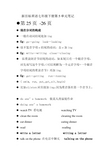
新目标英语七年级下册第5单元笔记●第25页-26页●现在分词的构成●一般在动词结尾处加ing●Eg: go—going look--looking●以不发音字母e结尾的动词,去e加ing●Eg: write—writing close--closing●以重读闭音节结尾的动词,如末尾只有一个辅音字母,应先双写这个字母,(可以理解为一个元音字母+一个辅音字母结尾的重读音节)再加ing.●Eg: get—getting run—running●( swim, run, put,get,sit,begin)●比如:Listen应直接加ing,因为重音落在第一个音节上。
●do one’s homework 做某人的家庭作业●doing one’s homework●watch TV 看电视watching TV●clean the room cleaning the room●eat dinner eating dinner●read reading●write a letter writing a letter●talk on the phone 在电话中聊天talking on the phone●What are you doing? 你在做什么?●I’m watching TV. 我正在看电视。
●What’s he doing? 他在干嘛?●He’s reading. 他正在阅读。
●现在进行时的构成●肯定句: 主语+ am/is/are+ doing +其他+时状.●Eg: He is doing his homework now.●否定句:主语+am/is/are +not+ doing+其他+时状.●Eg: He is not doing his homework now.●一般疑问句: Am/Is/Are +主语+ doing+其他+时状?●Eg: Is he doing his homework now?●肯定回答:Yes,主语 +am/is/are ●Eg Yes, he is.●否定回答:No, 主语+am not/isn’t/aren’t●Eg: No, he isn’t.●现在进行时的标志:●now●right now现在,此刻 (区别于just now用过去时) ●Look!●Listen!●It’s 10 o’clock (now).●Where is Tom?...2●these days这些天●In the first photo…●全方位透视“现在进行时”●定义:现在进行时表示目前__________ 或发生的动作或存在的状态。
(完整版)人教版七年级英语下册第五单元知识点总结

人教版七年级下册英语第五单元Unit5 Why do you like pandas? 知识要点重要短语like…a lot 非常喜欢… black and white 黑白相间 all day整天Let’s do= let us do 让我们做……kind of 有点儿,稍微 South Africa南非be from/come from 来自于save the elephants救助大象one of…其中之一a symbol of good luck好运的象征 get lost迷路 cut down 砍倒for a long time 很长时间in great danger处于(极大)危险之中things be made of ivory由象牙制成的东西 places with food and water有食物和水的地方kill……for……为……杀1.see the pandas 看熊猫2.my favorite animals我最喜欢的动物3.welcome to sp 欢迎来某地4.welcome back to sp 欢迎回到某地5.be from 来自e from来自7.in the zoo 在动物园里8.on the farm 在农场里9.my new pet 我的新宠物10.walk on two legs 用两条腿走11.kind of有点12.kind of interesting有点有趣13.a little有点14.a little boring有点无聊15.a kind of一种16.all kinds of 各种各样的17.all day整天18.a good name for sb对某人是一个好名字19.South Africa南非20.South China华南21.South America南美洲22.America, the USA美国23.the UK ,England英国24.the South Pole南极25.what animals什么动物26.save the elephants挽救大象27.one of +n复数。
人教版七年级下册英语Unit5知识点语法归纳总结

⼈教版七年级下册英语Unit5知识点语法归纳总结Unit 5 Why do you like pandas?1.短语归纳2.典句必背3.⽤法集萃(1)Well, because she’s kind of boring. 嗯,因为她有点⼉⽆聊kind of意为“稍微;有点⼉”,⽤来修饰形容词或副词,表⽰程度,和a bit, a little, a little bit意义相同。
例:The monkey is kind of cute. 那只猴⼦有点⼉可爱含有kind的短语还有:⽜⼑⼩试There are many ______ animals in the zoo. Most of them are _______ cute.A.kind of; kind ofB.kinds of; kind ofC.kinds of; kinds ofD.kind of; kinds of(2)She sleeps all day, and her name is Lazy. 她整天睡觉,她的名字叫Lazysleep可以作动词,也可以作名词,意为“睡觉”。
例:It’s time to sleep. 该睡觉了I sometimes have a sleep in the afternoon. 我有时下午睡觉派⽣词:sleepy adj.困乏的;想睡的asleep adj. 睡着的(fall asleep ⼊睡;睡着)⽜⼑⼩试Paul stayed up late to watch the soccer game last night and now he feels very_______ .A.sleep B . asleep C.sleepy(3)I don’t like cats because they’re lazy. 我不喜欢猫,因为它们很懒lazy作形容词,意为“懒散的;懒惰的”。
例:The boy is lazy and he never gets up early on weekends.反义词:hard-working adj. 勤奋的;勤勉的(4)People say that “an elephant never forgets”. ⼈们常说“⼤象从不忘记”辨析:forget to do sth.;forget doing sth.⽜⼑⼩试Don’t forget _____ your hands before you have dinner.A.to washB. washingC. washD. washes(5)Elephants can walk for a long time and never get lost. ⼤象能够长时间⾏⾛,⽽且从不迷路lost 作为形容词,意为“⾛失的,迷路的,失散的”或者“丢失的,遗失的”;常与系动词be或者get连⽤,表⽰“丢失,⾛失,迷路”。
- 1、下载文档前请自行甄别文档内容的完整性,平台不提供额外的编辑、内容补充、找答案等附加服务。
- 2、"仅部分预览"的文档,不可在线预览部分如存在完整性等问题,可反馈申请退款(可完整预览的文档不适用该条件!)。
- 3、如文档侵犯您的权益,请联系客服反馈,我们会尽快为您处理(人工客服工作时间:9:00-18:30)。
七年级英语第二学期Unit 5精学笔记姓名班级学队 . 精学要求每一知识点,都要求互检互签,互检在知识点的右侧空白处签上检查人员的名字。
精学笔记基础知识:单词1.熊猫________2.动物园______3.老虎______4.大象______5.狮子______6.长颈鹿_______7.动物_________互检签名:1.可爱的;机灵的_________2.懒散的;懒惰的_________3.聪明的_____4.美丽的;美好的_______5.种类______6.澳大利亚_________7.南方的.南;南方_______互检签名:1.非洲______ 2.宠物_______ 3.腿_____ 4.猫____5.睡觉______6.友好的________7.羞怯的;腼腆的______互检签名:1.救;救助_____ 2.旗,旗帜_____ 3.忘记;遗忘_____4.地点;位置______5.水_____6.危险_____7.砍;切_____互检签名:1.向下;沿着______ 2.树_____3.杀死;弄死_______4.超过,多于;在…上方________互检签名:重点短语:1.稍微;有点儿_______2.来自于________________3.南非_______4.整天___________5.很长时间___________6.迷路_______互检签名:7.有食物和水的地方______________________8.砍倒________ 9.处于(极大)危险中____________ 10.十二岁_________ 11.由……制成的_____________互检签名:12.--为什么?__________--因为……_________13.让某人做某事____________.14想要做某事__________15.……之一_____________ 16.忘记要做某事____________17.忘记做过某事______________18.对某人友好______________互检签名:重点句子:1.你为什么喜欢熊猫? -______ do you like pandas?2. 因为他们有点儿有趣_________they’re________interesting.3.约翰为什么喜欢树袋熊? -Why ______John ______koalas?4.因为它们非常可爱。
-Because they’re very ______.互检签名:5.-_________ you like tigers? 你为什么不喜欢老虎?-Because they’re _________. 因为它们真的吓人6.-Where ____lions ______? 狮子来自哪里?-They’re from ________________. 它们来自南非。
7.Elephants can walk ___a_____ time and never __________.大象能长时间行走并且从不迷路。
8.它们也能记住有食物和水的地方。
They can also remember _______ ______ _____and _______互检签名:9.但是,大象处于极大的危险之中。
/大象面临巨大的危险。
But elephants are __________________.10.人们砍倒了许多书,因此,大象正渐渐失去它们的家园。
People ________________many treesso elephants are _______ their homes.11 .现在仅有大约3000头大象(之前有超过10万头大象)。
Today , there are only about 3,000 elephants (_______100,000 before).互检互签:知识点一:Because she’s kind of boring . 因为她有点无聊.用法:kind of 意为’______、稍微“,后接__________。
kind of=_________=a bit=a little bit例1.The pandas are ____ cute。
A.kindB.kind ofC.a kind ofD.kinds of检测1.The movie is ___ interesting .We want to go and see it.A. a kind ofB.kind ofC.kinds ofD.one kind of2.The pandas are ____interesting so I like them.A.kind ofB.a kind ofC.kinds ofD. one kind of互检互签:知识点二:Let’s see the pandas first. 让我们先看熊猫吧!用法: Let’s ,意为,让我们,后接动词原形,let’s do sth.让我们做某事吧,表示提出建议.肯定答语: OK,/All right,/Good idea.等。
否定答语:Sorry,…例:-Let’s see the lions.-____________.I like the lions a lot.A.Sorry.B. Good ideaC. That’s right提出建议的常用句型:1.Shall we +动原?我们做…好吗?2.Why don’t you +动原?=Why not+动原?为什么不做某事?3.What /How about +动词-ing …?做某事怎么样?检测1.Let’s ______ (help) mother do the housework.2.Let’s _______ (eat) some apples.3.-Let’s play computer games.- ______,I have too much homework to do.A. Good ideaB. All rightC. Sorry互检互签:知识点三:Why don‘t you like the cat ?你为什么不喜欢猫?用法:Why don't+人称+__________+其他?”,意为“某人为什么不做某事?”,=“_____________+____________+其他?”。
例:1.Why __________ you ______home with me?=_____________go home with me?你为什么不和我一起回家?2.—Why not_________to the park now?—Good idea!Let's go.A.goB.to goC.goesD.going检测1.Why not ______(has)lunch at school?2.Why _______ (not)you play soccer after school?3.Let us _______(sing)with you.4.Let 's _______(begins)our class.5.--Let's___shopping this weekend.A.goB.goingC.goesD.togo6.--Let's play basketball after school. --_____.A.All rightB.That's rightC.Let‘s doD.That's all right.7.Why don‘t you ___your parents about it?A.tellsB.to tellC.tellingD.tell互检签名:知识点四:They can also remember places with food and water.他们也能够记着带有食物和水的地方.用法:with …介词短语,意为,带有。
做定语修饰名词(places),放在名词之后。
例1. I have a cat ______ three legs. 我有一只三条腿的猫。
2.I have a big house ______ a garden(花园).我有一套带花园的房子。
检测1.I remember the beautiful places _______ the long river.A.atB.haveC.withD.in2.This is an elephant ______ a long nose.A.atB.withC.haveD.in互检签名:知识点五:Where are they from? 他们来自哪里?用法:be from...意为,来自(某一地区,城市,国家,单位等),是......地方的人”,其主语为物时,表示“某物产于某地”。
be from 的同义词组是______________ .例:1.Where are you _______? 你来自哪里?=Where ______ you come________?2.Where is he from?他来自哪里?=Where _______ he ________________?检测1.Where are they from?(同义句转换)Where ___they ___________?2.Half the docters in the hospital ___ Beijing.es fromB.is fromC.be frome from3.--Where__the singer Liu Dacheng__? --Shandong.A.do; come fromB.does;fromC.is;fromD.is;come from知识点六:The elephant is one of Thailand’s symbols.大象是泰国的象征之一用法:1.one of…,意为,…之一2.one of+(the+形容词最高级)后接_____ 表示“__________________”3.one of ...作主语时,谓语动词要用_____形式.例1.One of my ________ ____ a doctor.我的一个朋友是医生。
2.She is one of the most famous _____. 她是最著名的运动员之一。
3:One of the animals_______from Thailand.eB.isC.areD.be检测1.One of our English teachers__from Americal.A.beB.areC.isD.was2.One of the__comes from China.A.WritersB.Writer3.Tom is one of_____.A.theyB.theirC.them4.One of the singers___to go to France.A.wantB.wantedC.wants互检互签:知识点七:we must save the trees and not buy things made of ivory.我们必须拯救树木,拒绝购买象牙制品用法:1.made是 make的过去式过去分词2.be made in+地点. 意为________________3. make sb do sth _______________例:This kind of watch is made _______ Shanghai .(from/of/in填空) 检测1.The bike is made ____Beijing.A. fromB.inC.of2.The interesting story makes me____ ( relax).3.The movie makes the girl _______.A laughB to laughC laughing互检互签:知识点八:People ____________ many trees so many elephants are losing their homes.人们大量砍伐树木,因此大象正在逐渐失去他们的家园.用法:cut down砍倒如果其后的宾语如果是名词可以放在cut 和down中间,也可以放在down后面,但如果是_____,必须放在二者之间例:The tall trees are dead(死的).They want to___.A. Cut down themB.cut them down检测1.They will___the trees because they want to build a museum here.A.cut downB.put downC.sit downD.slow down2.Trees are very important.We can't ___.A.cut them downB.cut it downC.cut down them互检互签:知识点九:people say that an elephant never forgets.人们说大象永远不会忘事用法:forget 动词,意为,忘记;遗忘‘(1)_______________忘记要做某事(事情还没有做)例题 Don't forget (close) the window.不要忘记关窗(窗还没关)(2) _____________ 忘记做过某事(事情已经做过)例题 I forget_________ (close) the door .我忘记关门了.(门还没关)2.--Mary dance best in our school.--I agree.I‘ll never forget ____her dance for the first time.A.seeingB.to seeC.seeD.seen检测( )1.Don‘t forget ___thanks when other people help you.A.acceptB. to acceptC.sayD.to say( ) 2.People don‘t forget ___the room while(当...时候)I am away.A .clean B. to clean C.cleaned D.cleaning( ) 3.I forget ___my English homework this morning.A.bringB. to bringC.bringingD.brought互检签名:知识点10:I like dogs because they’re friendly and smart.我喜欢狗因为他们友好而聪明.用法:1.friendly 形容词,其反义词为不友好的。
